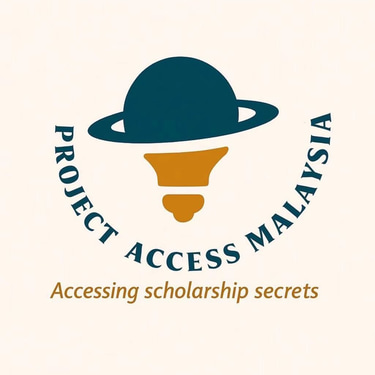SPM 2025 COMING UP - GOOD LUCK YOUNG MALAYSIANS!
What is Project Access Malaysia — and Why Did We Start It?
In this article, we will cover why Project Access Malaysia was founded, what makes it different from other scholarship initiatives, and how it aims to bring scholarship access and mentorship to students beyond the Klang Valley through active outreach and community-driven efforts.
4/2/20232 min read


Hello hello! Very excited to connect with all of you virtually!
In Malaysia, conversations about scholarships are often filled with uncertainty. Secondary school students outside of major cities rarely hear about opportunities early enough to apply, and many don’t even know where to begin. While the information exists, access to it doesn’t — and that gap determines whether a student’s future is limited or full of possibilities.
That’s where Project Access Malaysia comes in.
Project Access Malaysia was founded to democratize access to scholarship information and mentorship for every Malaysian secondary school student — not just those in the Klang Valley. We believe that talent is everywhere, but opportunity is not. Our mission is to close that gap by reaching students where they are — both online and offline — and empowering them with the tools, resources, and community support they need to pursue higher education.
We’re not trying to reinvent the wheel. We deeply respect and celebrate existing initiatives such as BASE Initiative, which provides one-on-one mentorship to help students navigate scholarships and university applications; Schola, which focuses on connecting talented youth with funding opportunities and personal development programs; and Closing the Gap (CTG), which has built an incredible mentoring community for B40 students, primarily in the Klang Valley.
However, many of these initiatives remain concentrated in urban centers — especially the Klang Valley — where schools are already more exposed to scholarship information and outreach programs. Our focus is on extending these efforts beyond Klang Valley, to schools and communities that have been historically overlooked.
Most scholarship platforms today operate on what we call “passive outreach.” They publish great resources online — websites, articles, webinars — and wait for students to find them. At Project Access Malaysia, we practice “active outreach.” This means we go out to find you. While starting off with a website, we use social media channels like Instagram and TikTok to make information accessible in the spaces where students already spend time (if you come across our website, please help share and repost - we don't have sponsorships in what we do!). In the background, we’re partnering with schools, community organizations, and educational institutions outside Klang Valley to expand awareness where it’s needed most.
Here’s what we do:
Centralize scholarship information. We collect and verify scholarship data, compiling them into a single, downloadable Excel database so students can easily compare eligibility, deadlines, and requirements.
Create digital awareness. We use social media storytelling to simplify information about scholarships, deadlines, and success tips — bringing clarity and confidence to students who may feel lost.
Build a community of voices. Through our Confessions Page on Instagram, past scholars can anonymously share their struggles, fears, or successes when applying for scholarships. This creates a space for honesty, support, and solidarity — because no student should feel alone in the process.
Enable outreach and mentorship. We’re connecting with partners and mentors nationwide to build a network that reaches the students who need it most — in every state, every district, every school.
Our goal isn’t to become the biggest platform — but the most inclusive one. We envision a Malaysia where every student, regardless of postcode or background, knows their options, understands how to apply, and has someone cheering them on.
Project Access Malaysia is not about changing the system — it’s about completing it. Because access shouldn’t depend on where you’re born, but on how hard you’re willing to dream.
